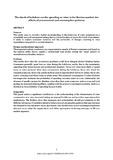The shock of lockdown on the spending on wine in the Iberian market: the effects of procurement and consumption patterns
Fecha
2021Autor
Versión
Acceso abierto / Sarbide irekia
Tipo
Artículo / Artikulua
Versión
Versión aceptada / Onetsi den bertsioa
Identificador del proyecto
Impacto
|
|
10.1108/BFJ-03-2021-0258
Resumen
Purpose: this study aims to provide a better understanding of the behaviour of wine consumers in a completely new and unexpected setting, that is, a forced lockdown due to the COVID-19 pandemic. It seeks to explain consumer decisions and the probability of changes occurring in wine expenditure compared to a normal situation. Design/methodology/approach: the empirical analysis, conducted on a repr ...
[++]
Purpose: this study aims to provide a better understanding of the behaviour of wine consumers in a completely new and unexpected setting, that is, a forced lockdown due to the COVID-19 pandemic. It seeks to explain consumer decisions and the probability of changes occurring in wine expenditure compared to a normal situation. Design/methodology/approach: the empirical analysis, conducted on a representative sample of Iberian consumers and based on the random utility theory, consists in the application of a multinomial logit model, setting the 'usual' pattern of expenditure as a baseline category. Findings: the results show that the coronavirus pandemic could have changed alcohol drinking habits. Consumers generally spent less on wine during the lockdown, maybe due to the uncertainty regarding their future income and professional situation. Those people more likely to spend more on wine were those who increased their wine consumption during the lockdown, those who drank for romantic purposes, those who purchased less wine in supermarkets but more online, those who used a wine app and those living in urban areas. The increased consumption of other alcoholic beverages also increases the probability of spending less than usual on wine. Additionally, the absence of certain reasons for drinking wine other than social purposes, such as wine and food pairing, its taste and relaxing effects, together with the previous consumption pattern leads to a decrease in the probability of spending less per bottle. Originality/value: This paper makes a significant contribution to the understanding of the determinants of wine consumption in a very abnormal setting, an imposed lockdown and provides important policy implications. The findings show that managers and policymakers should pay attention to the different influence of variables related to behaviour and consumption patterns that may contribute to an increase in the demand for less expensive wines. Specifically, they should focus on new consumption patterns that may arise, adapting the supply chain and defining appropriate marketing strategies to fill new market segments. [--]
Materias
Consumer behaviour,
Lockdown,
Multinomial logit model,
Wine price
Editor
Emerald
Publicado en
British Food Journal, 2021
Departamento
Universidad Pública de Navarra. Departamento de Gestión de Empresas /
Nafarroako Unibertsitate Publikoa. Enpresen Kudeaketa Saila
Versión del editor
Entidades Financiadoras
Financial support from Ministerio de Economia y Competitividad ECO2017-86054-C3-2-R; CT – Portuguese Foundation for Science and Technology - UIDB/SOC/04011/2020 and FEDER – Interreg SUDOE, VINCI – Wine, Innovation and International Competitiveness - SA069G18; and partially funded by the ERDF-Interreg SUDOE Project SOE3/P2/F0917, VINCI (Wine, Innovation and International Competitiveness), the Ministry of Science and Innovation of the Spanish Government (project PGC2018-095529-B-I00) and by the Department of Science, Innovation and Universities of the Government of Aragon (Research Group S55_20R).






